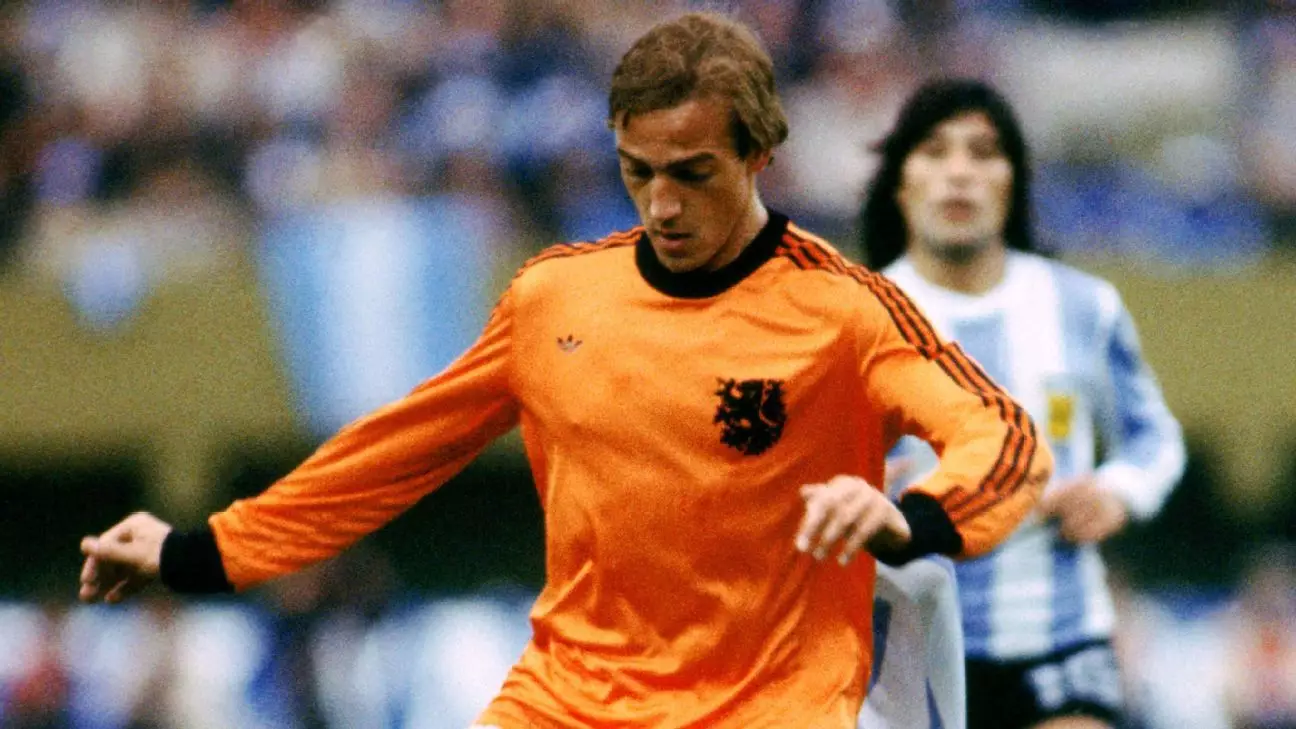The world of football has been significantly dimmed with the recent passing of Johan Neeskens, a celebrated figure from the Netherlands’ iconic “Clockwork Orange” teams of the 1970s. Neeskens, who had a remarkable career both as a player and a coach, succumbed to death at the age of 73 while participating in a coaching project in Algeria, organized by the Royal Dutch Football Association (KNVB). This sudden loss has left fans and fellow players alike grappling with the void left by a remarkable individual whose contributions to the game extended well beyond his playing days.
The KNVB acknowledged the profound impact of Neeskens on the sport in a heartfelt statement, expressing their condolences to his family and friends. It is a testament to Neeskens that his legacy is not only defined by his talent on the pitch but also by the compassionate character he displayed off it. As fans and analysts reflect on his life, it becomes evident that he was not just a sportsman but also a mentor who inspired several generations of players through his dedication and love for the game.
Johan Neeskens’ international football career was marked by both high peaks and heart-wrenching lows. He participated in two consecutive World Cup finals, a remarkable achievement that few players can boast. In the 1974 World Cup, Neeskens netted a crucial penalty that put the Dutch team ahead of West Germany in a historic showdown. Yet, despite their masterful style of “total football,” the Netherlands fell to the Germans, a painful memory that Neeskens would not forget. He famously echoed this sentiment: “The most beautiful football doesn’t always win,” encapsulating the bittersweet reality of sports.
Four years later, in the 1978 World Cup, the Netherlands again found themselves on the precipice of victory, only to suffer another heart-wrenching defeat, this time at the hands of Argentina. Neeskens’ playing career was undeniably filled with extraordinary moments, yet the absence of a World Cup title adds a layer of poignance to his legacy. With 49 international appearances and 17 goals to his name, Neeskens certainly made his mark, but these near misses serve as a reminder of the unpredictable nature of football.
Neeskens’ club career was equally illustrious, having played for elite teams such as Ajax and Barcelona. His time at Ajax during the early 1970s coincided with one of the most dominant periods in the club’s history, where he was instrumental in claiming three consecutive European Cups. His adept skills in midfield were pivotal in constructing the golden era for Ajax, making him a beloved figure among fans.
Barcelona, too, remembers Neeskens fondly, celebrating him as a “blaugrana legend.” His ability to adapt and thrive in varied footballing cultures further exemplifies his prowess. Neeskens later transitioned to the New York Cosmos, contributing to the rapid rise of soccer in the United States during the late 1970s.
Beyond statistics and accolades, what stands out about Johan Neeskens is his profound belief in collective success. During various reunions and interviews, he emphasized that championships are not won by individuals but by the unity of the team. His philosophy – “The collective, that’s what it’s all about” – resonates with aspiring footballers even today, reminding them of the essential nature of teamwork in sports.
Post-retirement, Neeskens took on roles as an assistant coach, imparting his decades of experience to younger players and honing the next generation. His influence reached not only the Netherlands but also beyond, connecting him with football programs across different countries, including Australia.
As we mourn the loss of Johan Neeskens, it is critical to recognize the full spectrum of his impact on football. He was not merely a player; he was a beacon of hope, a source of inspiration, and a mentor. The football community joins in sorrow as we say farewell to a remarkable individual whose legacy will forever remain a vital chapter in the history of the sport. In honoring Neeskens, we also celebrate the spirit of football, one that brings people together, transcending borders and cultures. As we look back on his life, we should carry forward the lessons he imparted, echoing his belief that “there is only one star, and that is the team.” Rest in peace, Johan Neeskens; your contributions to football will never be forgotten.

